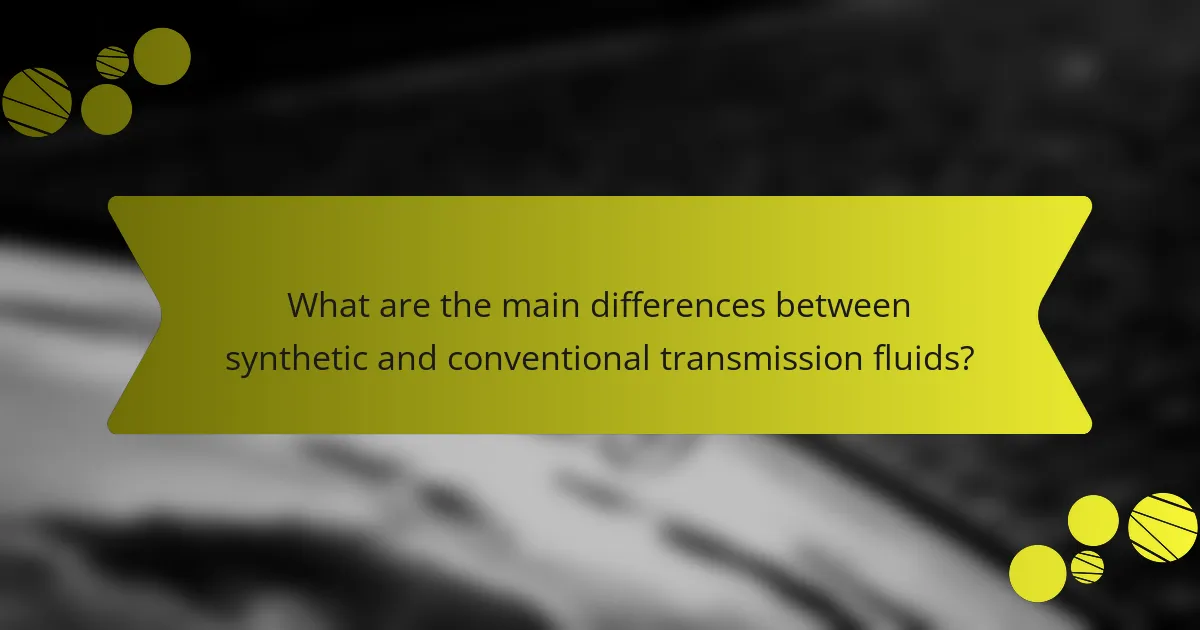Synthetic transmission fluid enhances vehicle performance and longevity through improved lubrication and temperature stability. This article explores its benefits, usage in various transmissions, and comparisons with conventional fluids. Key features include superior wear protection, better fuel efficiency, and unique formulations across brands. Best practices for switching to synthetic fluids are also discussed to ensure optimal vehicle operation.

What are the key benefits of synthetic transmission fluid?
Synthetic transmission fluid offers enhanced performance, protection, and longevity compared to conventional fluids. Its benefits include improved temperature stability, reduced friction, and better lubrication, resulting in smoother gear shifts and extended transmission life. Additionally, synthetic fluids resist oxidation and breakdown, providing consistent performance in extreme conditions. These properties make synthetic transmission fluid a superior choice for many vehicles.
How does synthetic transmission fluid enhance vehicle performance?
Synthetic transmission fluid enhances vehicle performance by providing better lubrication, reducing friction, and improving heat resistance. This results in smoother gear shifts and increased efficiency. Compared to conventional fluids, synthetic options maintain their properties over a wider temperature range, ensuring optimal performance in extreme conditions. Additionally, they often contain additives that help prevent wear and corrosion, further extending the lifespan of the transmission.
What cost savings can synthetic transmission fluid provide over time?
Synthetic transmission fluid can provide significant cost savings over time due to its extended lifespan and improved efficiency. Users can expect to change synthetic fluid less frequently, reducing maintenance costs. Additionally, synthetic fluids offer better protection against wear, potentially extending the life of the transmission and avoiding costly repairs. Research indicates that synthetic transmission fluid can enhance fuel economy by 1-3%, leading to further savings. Overall, these factors contribute to long-term financial benefits for vehicle owners.
Why is synthetic transmission fluid preferred for extreme driving conditions?
Synthetic transmission fluid is preferred for extreme driving conditions due to its superior thermal stability and resistance to breakdown. It maintains optimal viscosity across a wide temperature range, ensuring consistent performance. Additionally, synthetic fluids provide better lubrication, reducing wear on transmission components. Their enhanced properties lead to improved fuel efficiency and extended service life, making them ideal for high-stress environments.

How is synthetic transmission fluid used in different vehicles?
Synthetic transmission fluid is used in various vehicles to enhance performance and longevity. Its superior lubrication properties reduce friction, improve shifting smoothness, and extend transmission life.
In automatic transmissions, synthetic fluids maintain consistent viscosity across a wide temperature range, ensuring reliable operation in extreme conditions. For manual transmissions, these fluids provide better protection against wear and tear, enhancing gear engagement.
Synthetic fluids are particularly beneficial for high-performance vehicles, where they withstand higher temperatures and pressures. They also contribute to improved fuel efficiency by reducing energy loss in the transmission system.
Compared to conventional fluids, synthetic transmission fluids offer better thermal stability and resistance to oxidation, leading to less frequent fluid changes and overall lower maintenance costs.
Which vehicles benefit the most from synthetic transmission fluid?
Vehicles that benefit the most from synthetic transmission fluid include high-performance cars, luxury vehicles, and those in extreme driving conditions. These vehicles experience enhanced lubrication, improved temperature stability, and reduced wear. Sports cars often utilize synthetic fluids for superior shifting performance. Additionally, heavy-duty trucks and SUVs benefit from synthetic transmission fluid due to its resistance to breakdown under high loads. Overall, vehicles requiring optimal performance and durability gain the most from synthetic options.
What are the recommended usage guidelines for synthetic transmission fluid?
Synthetic transmission fluid should be used according to the vehicle manufacturer’s specifications. Always check the owner’s manual for the correct type and viscosity. Change intervals typically range from 30,000 to 100,000 miles depending on fluid quality and driving conditions. Ensure proper storage to maintain fluid integrity.
How does synthetic transmission fluid affect maintenance schedules?
Synthetic transmission fluid can extend maintenance intervals, reducing the frequency of fluid changes. Its superior properties, including better heat resistance and enhanced lubrication, lead to less wear on components. As a result, vehicles using synthetic fluids may require service less often compared to those with conventional fluids. This can translate into lower overall maintenance costs and improved vehicle longevity.

What are the main differences between synthetic and conventional transmission fluids?
Synthetic transmission fluids generally outperform conventional fluids in several key areas. They offer superior temperature stability, improved lubrication, and enhanced wear protection. Synthetic fluids resist oxidation and degradation, extending transmission life. Additionally, they provide better performance in extreme temperatures, making them suitable for a wider range of driving conditions. In contrast, conventional fluids may be less expensive but often require more frequent changes and may not perform as well under stress.
How do performance characteristics differ between synthetic and conventional fluids?
Synthetic transmission fluids generally outperform conventional fluids in several key performance characteristics. Synthetic fluids provide better thermal stability, lower volatility, and superior lubrication properties. They resist breakdown under high temperatures, leading to prolonged transmission life. Additionally, synthetic fluids often exhibit improved viscosity index, ensuring consistent performance across a wider temperature range. In contrast, conventional fluids may offer lower initial costs but can lead to more frequent maintenance and replacements. Overall, the benefits of synthetic fluids make them a preferred choice for modern vehicles requiring enhanced performance and longevity.
Which types of transmission systems are best suited for synthetic fluids?
Synthetic transmission fluids are best suited for automatic and continuously variable transmission systems. These fluids enhance performance and efficiency due to their superior thermal stability and lubrication properties. They provide better protection against wear and can improve fuel economy. Additionally, synthetic fluids resist breakdown better than conventional fluids, making them ideal for high-performance and heavy-duty applications.
What environmental considerations are associated with synthetic versus conventional fluids?
Synthetic transmission fluids generally have a lower environmental impact compared to conventional fluids. Synthetic fluids are designed to last longer, reducing the frequency of disposal and minimizing waste. They often contain fewer harmful additives, leading to reduced emissions during production and use. Additionally, synthetic fluids can improve fuel efficiency, which contributes to lower greenhouse gas emissions. In contrast, conventional fluids may degrade faster and require more frequent changes, increasing their environmental footprint.

What unique features distinguish various brands of synthetic transmission fluid?
Various brands of synthetic transmission fluid are distinguished by their unique formulations and performance characteristics. For example, some brands prioritize high-temperature stability, while others focus on enhanced fuel efficiency. Key features include specific additive packages that improve wear protection and oxidation resistance. Additionally, unique attributes like compatibility with specific vehicle types or manufacturer recommendations further differentiate these products.
How does the formulation of synthetic transmission fluid vary among brands?
The formulation of synthetic transmission fluid varies significantly among brands, impacting performance and compatibility. Key differences include base oil composition, additive packages, and viscosity ratings. Some brands prioritize high-temperature stability, while others focus on improved fuel efficiency. Unique formulations may enhance shifting smoothness or prolong component life, making brand selection crucial for optimal vehicle performance.
What proprietary additives are used in leading synthetic transmission fluid brands?
Leading synthetic transmission fluid brands utilize proprietary additives to enhance performance and longevity. These additives often include friction modifiers, detergents, and anti-wear agents. For instance, brands like Mobil 1 and Amsoil incorporate unique formulations that improve shifting smoothness and thermal stability. Additionally, some brands may use specific seal conditioners to prevent leaks and maintain fluid integrity. These proprietary blends distinguish synthetic fluids from conventional options, providing superior protection and efficiency.

What are the rare attributes of synthetic transmission fluids that users should know?
Rare attributes of synthetic transmission fluids include extended lifespan, superior thermal stability, and enhanced protection against wear. These fluids often contain advanced additives that improve performance in extreme conditions. Additionally, some synthetic fluids offer better fuel efficiency and lower environmental impact compared to conventional options.
Which synthetic transmission fluids offer exceptional thermal stability?
Synthetic transmission fluids known for exceptional thermal stability include Mobil 1 Synthetic ATF, Amsoil Signature Series Multi-Vehicle ATF, and Royal Purple Max ATF. These fluids maintain performance under high temperatures, reducing the risk of overheating and breakdown. Their advanced formulations often feature additives that enhance oxidation resistance and thermal stability, ensuring longer fluid life and better protection for transmission components.
What are the long-term effects of synthetic transmission fluid on transmission longevity?
Synthetic transmission fluid can significantly enhance transmission longevity by reducing wear and maintaining optimal performance. Its unique formulation provides better thermal stability and resistance to breakdown compared to conventional fluids. This results in less friction and improved lubrication, which can extend the lifespan of the transmission components. Additionally, synthetic fluids often contain additives that prevent sludge and deposit formation, further promoting efficiency and longevity. As a result, vehicles using synthetic transmission fluid may experience fewer maintenance issues and a longer operational life.

What best practices should be followed when switching to synthetic transmission fluid?
To switch to synthetic transmission fluid, follow these best practices: drain the old fluid completely, clean the transmission pan and filter, and refill with the appropriate synthetic fluid. Ensure compatibility with your vehicle’s specifications. Synthetic fluids offer superior protection and performance compared to conventional fluids. Regularly check fluid levels and replace as needed to maintain optimal performance.
How can users ensure a smooth transition to synthetic transmission fluid?
To ensure a smooth transition to synthetic transmission fluid, users should follow a systematic approach. First, flush the existing conventional fluid to remove contaminants. Next, select a high-quality synthetic fluid compatible with the vehicle’s specifications. Gradually introduce the synthetic fluid by mixing it with the remaining conventional fluid during the first change. Regularly monitor performance and fluid levels for optimal results. Finally, adhere to the manufacturer’s recommended change intervals to maintain transmission health.
What common mistakes should be avoided when using synthetic transmission fluid?
Common mistakes to avoid when using synthetic transmission fluid include neglecting manufacturer specifications, failing to check fluid levels regularly, using incompatible fluids, and overlooking the need for periodic fluid changes. These errors can lead to transmission damage and decreased performance. Always ensure compatibility and follow maintenance recommendations for optimal results.
What expert tips can help maximize the benefits of synthetic transmission fluid?
To maximize the benefits of synthetic transmission fluid, maintain regular fluid changes and monitor fluid levels. Use high-quality synthetic fluids that meet manufacturer specifications for optimal performance. Ensure proper installation to prevent leaks and contamination. Regularly check for signs of wear in transmission components to address issues early.



